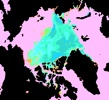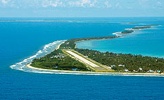Over the next couple of weeks, I’ll be posting less frequently – I’m donning my truffle hat and heading off to a conference in China. I’ll be checking in from time to time, as internet connections allow, and will try to keep in touch with climate news in NZ and overseas. You may expect me to plant some trees on my return.
Meanwhile, a few interesting links: British dairy farmers are waking up to their carbon footprint – which suggests that our farmers will need to do more than rely on their “global warming hero
Tag: sea
First forecast for the next ten years
 Researchers at the Hadley Centre in Britain have produced the world’s first short range climate forecast, covering the next ten years. And there are no surprises, it’s going to get warmer. From New Scientist:
Researchers at the Hadley Centre in Britain have produced the world’s first short range climate forecast, covering the next ten years. And there are no surprises, it’s going to get warmer. From New Scientist:
Although average global temperatures have been relatively flat in recent years, the model says they will start rising again next year. At least half of the years between 2009 and 2015 will exceed the current warmest year on record. By 2015, global temperatures will be 0.5 °C above the average value for the last 30 years.
Arctic ice sets new record
 I follow the Arctic sea ice extent at Cryosphere Today. The site publishes pictures, maps and graphs of sea ice in the Arctic and Antarctic, derived from NASA satellite data. They’ve just announced a worrying new record:
I follow the Arctic sea ice extent at Cryosphere Today. The site publishes pictures, maps and graphs of sea ice in the Arctic and Antarctic, derived from NASA satellite data. They’ve just announced a worrying new record:
Today (August 9th), the Northern Hemisphere sea ice area broke the record for the lowest recorded ice area in recorded history. The new record came a full month before the historic summer minimum typically occurs. There is still a month or more of melt likely this year. It is therefore almost certain that the previous 2005 record will be annihilated by the final 2007 annual minima closer to the end of this summer. In previous record sea ice minima years, ice area anomalies were confined to certain sectors (N. Atlantic, Beaufort/Bering Sea, etc). The character of 2007’s sea ice melt is unique in that it is dramatic and covers the entire Arctic sector. Atlantic, Pacific and even the central Arctic sectors are showing large negative sea ice area anomalies.
I find this news disturbing for two reasons. First, the fact that the new record should be set so early in the season. That suggests that there is a lot more melting to go. The second is the language: normally cautious scientists seldom use words like “annihilate
Tuvalu sunk by pineapples
 The NZCSC has been trumpeting the arrival in New Zealand of professor (emeritus) Nils-Axel Mörner, “a leading world authority on sea levels and coastal erosion”. Prof Mörner’s mission? To reassure us that sea level rise is not happening. Mörner first takes the ritual swipe at An Inconvenient Truth:
The NZCSC has been trumpeting the arrival in New Zealand of professor (emeritus) Nils-Axel Mörner, “a leading world authority on sea levels and coastal erosion”. Prof Mörner’s mission? To reassure us that sea level rise is not happening. Mörner first takes the ritual swipe at An Inconvenient Truth:
I can assure you there have been no rises in sea levels, so you should ask yourselves how much else of what Gore says is similarly false?
NZ’s low carbon cows: global warming heroes?
 A new report from Lincoln University´s Agribusiness and Economics Research Unit finds that New Zealand’s dairy industry has a smaller global warming footprint than the UK’s, even after taking into account the emissions resulting from shipping products half way round the world. From Lincoln’s press release:
A new report from Lincoln University´s Agribusiness and Economics Research Unit finds that New Zealand’s dairy industry has a smaller global warming footprint than the UK’s, even after taking into account the emissions resulting from shipping products half way round the world. From Lincoln’s press release:
The Lincoln study´s central finding is that the UK produces 35 percent more emissions per kilogram of milk solid than New Zealand and 31 percent more emissions per hectare than New Zealand – even including transportation from New Zealand to Britain and the carbon dioxide generated in that process.
The report’s lead author, professor Caroline Saunders, explains the importance of this finding:
“Our report clearly demonstrates the fallacy of using a simplistic concept like `food miles´ as a basis for restrictive trade and marketing policies. It is obvious that production systems and not transport are the major contributor to the differences in greenhouse gas emissions and energy use.
